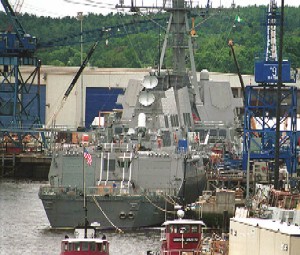

In all the recent furor over the Base Realignment and Closure (BRAC) report that targeted the Portsmouth Naval Shipyard and NAS Brunswick in Maine another defense story that has the potential to have a big impact on workers and coastal communities here seems to have fallen by the wayside. In the interests of efficiency and to meet future needs, the Navy proposed halving the number of shipyards working on the DDX destroyer and a future "stealthy" class of surface warship and withdrawing the contract from either the Ingalls yard in Mississippi or from Bath Iron Works here in midcoast Maine.
Predictably, there was a huge outcry from state legislators and our delegation to Washington, most notably from Senators Olympia Snowe and Susan Collins. The usual arguments were trotted out; we are at war, it is shortsighted to limit our warship building infrastructure, the yard builds outstanding vessels, and so on. There were even the now common whispers from the fringes and flanks that the proposed changes were political payback directed at Maine's maverick Republican senators who are gambling their reelection chances in this fairly liberal northeastern state on voting much of the time with the Democrats. In short, these exchanges followed the script, and the script does not allow for one important factor to be discussed maturely; namely the defense needs of the United States.
The case for withdrawing the Navy contract from Bath Iron Works is less apparent at first glance than the real need to close both Portsmouth and Brunswick. The two bases slated for closure/realignment are relics of the Cold War, designed to quickly service a North Atlantic fleet and maintain and fly submarine hunters protecting the arctic approaches and the eastern seaboard from Soviet penetration. In our current "war on terror" the need for coastal picket lines and routine searches for surface and subsurface fleets seems limited. If there is a seaborne attack (and I fully believe there will be) it will come undercover aboard a civilian ship. The money spent on maintaining aging air wings of P-3 Orion subhunters would be better spent on port security if we are serious about saving American lives. The Customs Agent, not the depth charge, is going to be the federal expenditure that saves lives. But we still need ships, even if they are not going to be based in the North Atlantic.
In this current conflict vessels larger than coastal/riverine raiders, stealthier than submarines, or smaller than aircraft carriers seem like expensive ornaments, but given that a ship will likely be in service for at least twenty years it is wise to plan ahead to the next threat. For many students of geopolitics and strategy, the next threat is likely to come from east Asia. North Korea is a given, and there is a lot of agreement that China will increasingly challenge American Pacific hegemony, or that a Sino-Indian conflict or Indian-Pakistani war will greatly destabilize that region. Putting aside the maniac in Pyongyang, China is the key. Already the Chinese are subtly pursuing global energy resources and markets and are loudly rattling the saber over Taiwan. Should the worst come to pass (and that is what military planners are paid to expect) the United States will need the best possible surface and subsurface fleets in order to engage with an enemy an ocean away. So shouldn't BIW keep building destroyers?
In my humble opinion, no. I don't approach this question from a liberal, pacifist point of view (in my ideal world we wouldn't need warships, but my ideal world would per force have to be devoid of most humans for that to come to pass); those who know me well are aware that I believe in a muscular liberalism that is prepared to defend (not impose) ideals with the sword. If you have to take that step, you have to make your opponent rue the day he took up arms against you (three of my greatest heroes are Oliver Cromwell, Union General William Sherman, and Air Marshal Arthur Harris; men who understood war to be so terrible an instrument it could not be implemented half-heartedly). Therefore, a free and democratic nation owes it to its citizens to be well prepared to defend itself and to approach that defense in a robust, clear eyed, and intelligent manner. We need the ships, we just don't need them built in Maine, a continent away from where they are likely to be employed in battle. What we need instead is a west coast mid-sized surface vessel shipyard.
There will be those that point out that concentrating surface construction on the Pacific coast will lay our yards open to missile attack by whoever winds up on the enemies list +1. I would argue that given the great (but slowly decreasing) gap between American and Chinese (for sake of argument) missile and naval forces, the risks of a sub or ICBM launched Pearl Harbor or sustained facility attrition campaign are much lower than some kind of asymmetric attack, such as a forced closure of the Panama Canal by sabotage preventing Atlantic based or built vessels from quickly reaching the Pacific and then Taiwan, or Japan, or Indonesia (and so on). Between SOSUS, satellites, aircraft, subs, and ships we will be able to protect the west coast. Any missile launch will not herald the start of a war, but rather the end of an opponent's existence. Without going any further into the nature of any Pacific conflict, BIW does not serve any current or near-to-mid range future strategic defense need.
So rather than trying to fight for a Cold War relic, why doesn't Maine's congressional delegation grab the nettle and be the first to break this paradigm? I would much rather see Maine out of this fraught business of fighting for our bases or shipyard every couple of years and instead looking at retraining the workforce and attracting new and diverse employment opportunities. Let the other 49 states tilt at federal windmills; let Maine escape the one industry town/"if the mill dies we all die" mentality; and let our Senators turn their proven rhetorical skills and positions as bi-partisan teases towards a new century rather than keep looking wistfully over their shoulders towards a past that was never as glorious as the geezers maintain. As Elvis Costello sang;
"Is it worth it
A new winter coat and shoes for the wife
And a bicycle on the boy’s birthday
It’s just a rumour that was spread around town
By the women and children
Soon we’ll be shipbuilding
Well I ask you
The boy said ’dad they’re going to take me to task
But I’ll be back by christmas’
It’s just a rumour that was spread around town
Somebody said that someone got filled in
For saying that people get killed in
The result of this shipbuilding
With all the will in the world
Diving for dear life
When we could be diving for pearls
It’s just a rumour that was spread around town
A telegram or a picture postcard
Within weeks they’ll be re-opening the shipyards
And notifying the next of kin
Once again
It’s all we’re skilled in
We will be shipbuilding
With all the will in the world
Diving for dear life
When we could be diving for pearls."



4 comments:
Wisdom Weasel wrote:
"I would much rather see Maine out of this fraught business of fighting for our bases or shipyard every couple of years and instead looking at retraining the workforce and attracting new and diverse employment opportunities."
You and I are on the same page, brother! Isn't it interesting that you read a few of us bloggers talking about the economic dead-end of trying to keep cold-war bases open, yet our local media moguls seem blind to this hook or angle?
Anyways, an excellent post and a worthy addition to the often one-sided debate on what passes for economic development in communities like Brunswick, Portsmouth and other communities subsidized by the death industry.
Wow. Amazing that Elvis Costello wrote a song just to back up your excellent observations. What connections you must have!
Continue your strong stands for both economic sense and muscular liberalism.
Oh my word, I've managed to coax a comment out of RPS! The end of the world is closer than we thought...
Previously when I tried to sign on to leave comments, Blogger asked me for seven forms of identification and a major credit card number, and then tried to perform retinal scanning to prove I was indeed myself.
Now that the procedure for contributing even more gibberish to the gobstopping heaps found here has been much simplified, I shall (like Douglas MacArthur) return to continue the process.
Post a Comment